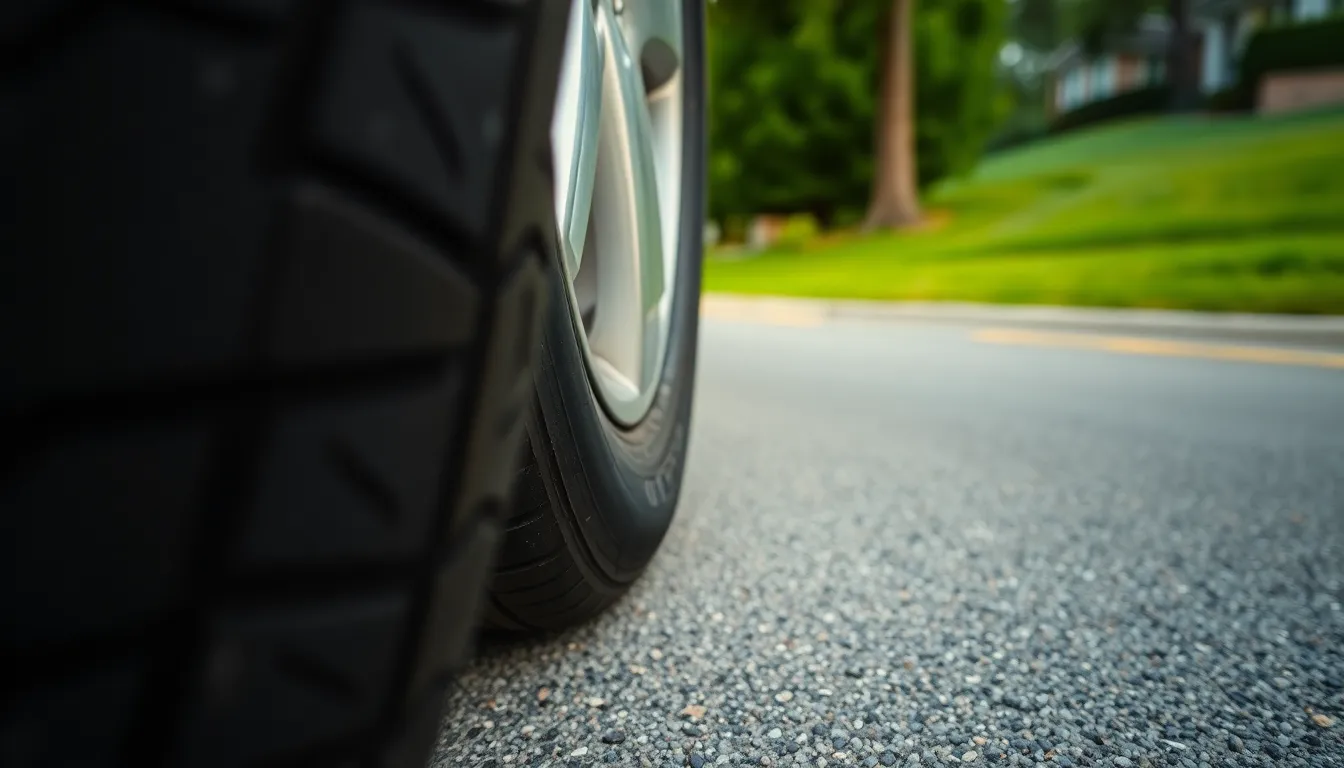We’ve all been there – you’re making a turn and suddenly hear that unmistakable squeaking sound coming from your tires. It’s one of those car noises that immediately grabs your attention and leaves you wondering if something’s seriously wrong with your vehicle.
Tire squeaking during turns is actually more common than you might think and can stem from several different causes. While some instances are completely normal and harmless others could signal underlying issues that need immediate attention. The key is understanding when to worry and when it’s just your car communicating normal operational sounds.
Whether you’re dealing with occasional squeaks on sharp turns or persistent noise every time you steer we’ll help you identify the root cause and determine the best course of action. From simple maintenance fixes to more serious mechanical concerns understanding tire squeaking can save you both money and potential safety hazards down the road.
What Causes Tire Squeaks When Turning
Tire squeaking during turns stems from several mechanical issues that affect how your tires grip the road surface. These sounds occur when rubber loses proper contact with the pavement or when components create friction during steering maneuvers.
Worn or Low Tread Tires
Tire tread depth below 2/32 of an inch creates insufficient grip between rubber and road surfaces during turns. Smooth tire surfaces can’t channel water effectively and slip more easily on dry pavement when cornering. We see this condition most frequently in vehicles with over 60,000 miles that haven’t had tire rotations every 5,000 to 7,500 miles.
Uneven tread wear patterns like cupping or feathering also generate squeaking sounds when turning. These irregular surfaces create vibrations and noise as they make contact with the road. Checking tread depth with a penny test reveals whether replacement becomes necessary for optimal turning performance.
Improper Tire Pressure
Underinflated tires flex excessively during turns and create squeaking sounds from increased sidewall friction. Pressure levels 5 PSI or more below manufacturer recommendations cause this flexing behavior. Overinflated tires reduce the contact patch with the road and can squeak when the smaller surface area loses grip during cornering.
Temperature changes affect tire pressure by approximately 1 PSI for every 10-degree Fahrenheit shift. Monthly pressure checks using a digital gauge ensure optimal levels between 30-35 PSI for most passenger vehicles. Maintaining proper inflation prevents premature wear and eliminates pressure-related squeaking during turns.
Misaligned Wheels
Wheel alignment issues force tires to scrub sideways against the road surface when turning. Toe alignment off by just 0.17 inches causes tire squeaking and increases tread wear by up to 25%. Camber angles exceeding 1.5 degrees positive or negative create uneven contact patches that generate noise during cornering.
Hitting potholes larger than 3 inches deep or curbs at speeds above 5 mph commonly knocks wheels out of alignment. Professional alignment services adjust toe camber and caster angles to manufacturer specifications. Proper alignment eliminates the sideways tire scrubbing that creates squeaking sounds when turning.
Worn Suspension Components
Ball joints with excessive play allow wheels to move unpredictably during turns and create tire squeaking. Worn tie rod ends produce similar effects by letting wheels shift position under cornering loads. Struts and shocks that have lost 50% of their dampening ability can’t control tire contact with the road effectively.
Bushings in control arms and sway bar links deteriorate after 80,000 to 100,000 miles of use. These rubber components isolate metal parts and maintain proper suspension geometry. Replacing worn suspension parts restores stable wheel positioning and eliminates the erratic tire movement that causes squeaking during turns.
How to Diagnose Tire Squeaking Issues
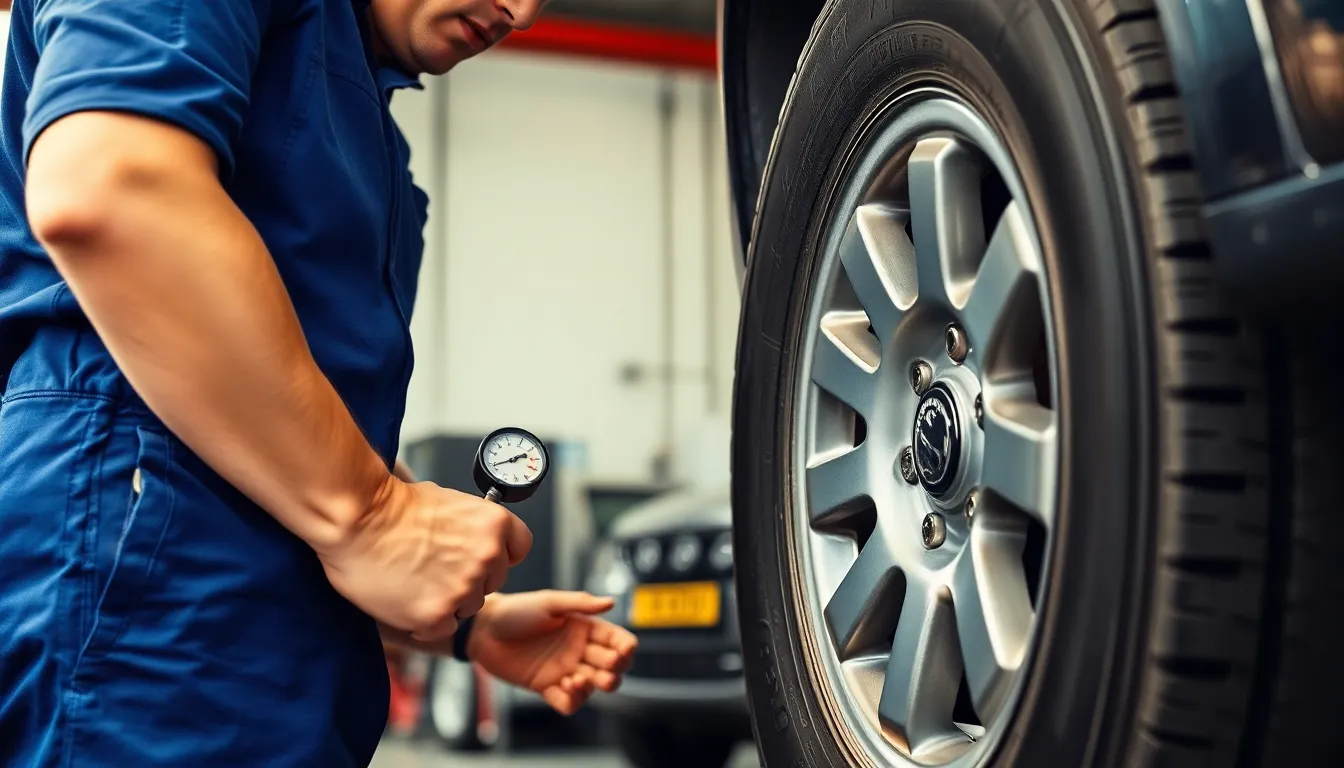
Diagnosing tire squeaking when turning requires systematic inspection techniques that identify exact mechanical problems. We can effectively pinpoint the root cause through visual examination and professional diagnostic equipment.
Visual Inspection Techniques
Check Tire Pressure First: We recommend using a tire pressure gauge to verify all tires match manufacturer specifications. Important pressure differences between tires often indicate underinflation or overinflation causing squeaking sounds during turns.
Examine Tire Tread Patterns: Inspect each tire for uneven wear spots, bald patches, or damaged tread surfaces that reduce road grip. Tires showing irregular wear patterns typically produce squealing noises when cornering due to insufficient traction.
Inspect Wheel Components: Look for loose wheel lugs, damaged wheel covers, or debris trapped between tire and wheel assemblies. These loose components create friction and generate noise when tires rotate during turning maneuvers.
Observe Tire Sidewall Flex: Excessive sidewall bulging or irregular flex patterns indicate underinflation or internal tire damage. Such tire deformation contributes to squeaking sounds as the tire struggles to maintain proper road contact.
Professional Diagnostic Tools
Tire Pressure Monitoring Systems (TPMS): Advanced TPMS technology provides real-time pressure monitoring across all tires, alerting drivers to underinflation before squeaking develops. This diagnostic tool prevents pressure-related tire noise through continuous monitoring.
Wheel Alignment Equipment: Professional shops use computerized alignment racks to detect misaligned wheels causing uneven tire wear and noise. Balancing machines identify tire imbalances that contribute to squeaking during cornering.
Tread Depth Measurement Tools: Precision tread depth gauges accurately measure remaining tire tread to determine replacement needs. Tires below optimal tread depths lose traction and produce squealing sounds when turning.
Acoustic Detection Systems: Specialized repair facilities employ acoustic sensors to isolate exact noise locations during vehicle operation. These systems pinpoint whether squeaking originates from tire contact, wheel components, or suspension elements.
When Tire Squeaks Indicate Serious Problems
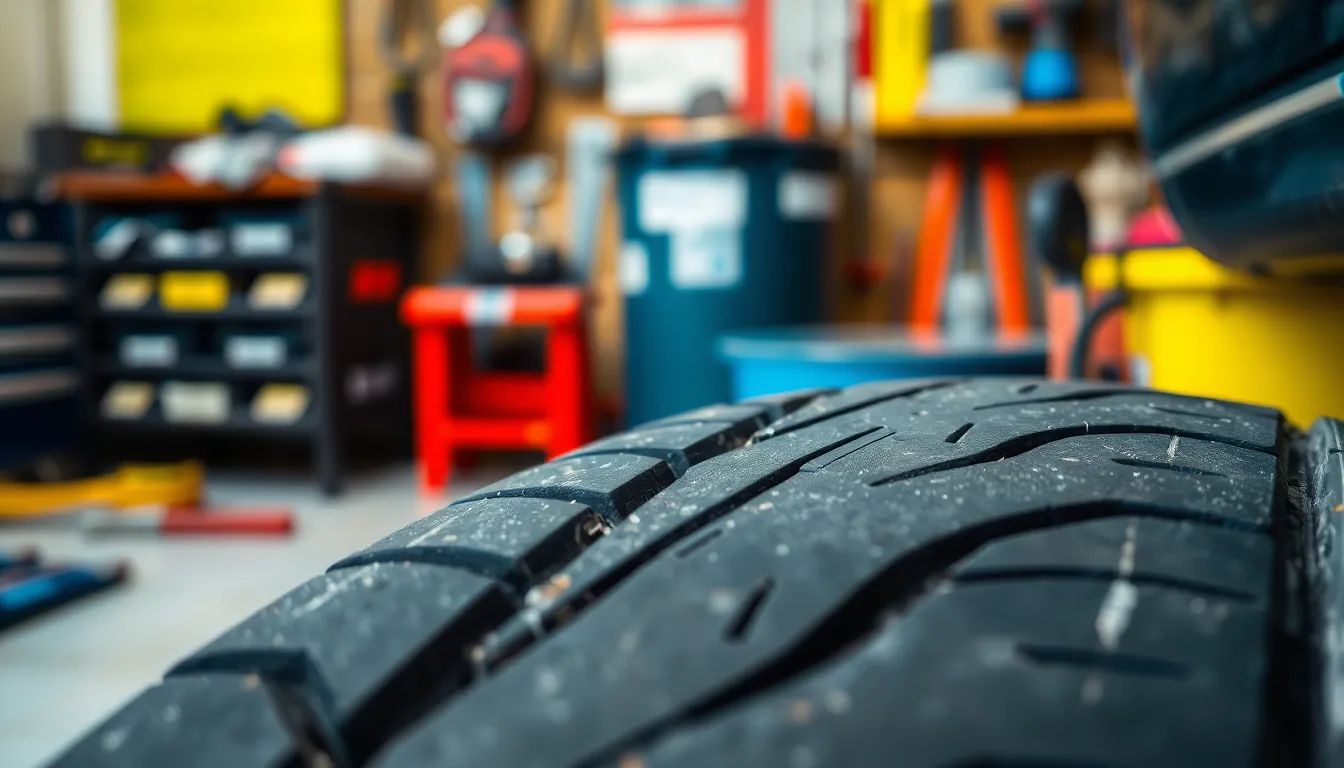
Tire squeaks during turns often signal mechanical failures that compromise vehicle safety and performance. Understanding these warning signs helps us identify when immediate attention becomes necessary.
Safety Concerns and Warning Signs
Loss of traction represents the most critical safety concern when tires squeak during turns. This reduced grip increases skidding risk and accident probability, particularly during sharp maneuvers or on wet surfaces. We observe that sudden traction loss can lead to vehicle instability and potential collisions.
Continuous squeaking indicates premature tire wear that accelerates component degradation throughout the vehicle. The high-pitched squeal during cornering often precedes complete tire failure if left unaddressed. Emergency situations become more dangerous when squeaking tires provide inadequate road contact during evasive maneuvers.
Warning signs include persistent noise regardless of road conditions, squeaking that intensifies with turning speed, and sounds accompanied by vibration through the steering wheel. We recognize these symptoms as indicators requiring immediate professional inspection to prevent accidents.
Potential Damage to Other Vehicle Components
Misaligned wheels causing tire squeaks simultaneously affect suspension and steering systems over time. The uneven forces created by squeaking tires transfer stress to wheel bearings, shock absorbers, and steering linkages. Extended exposure to these conditions leads to expensive repairs beyond simple tire replacement.
Brake system components suffer when squealing occurs during both turning and braking operations. Worn brake pads or damaged rotors create similar noise patterns that compromise stopping ability and safety. We identify this overlap as particularly concerning since it affects multiple critical vehicle systems.
Steering mechanisms experience accelerated wear when tires consistently squeak during turns. Power steering pumps work harder to compensate for increased resistance from misaligned or underinflated tires. Wheel alignment equipment shows that vehicles with persistent tire squeaking develop measurement discrepancies exceeding manufacturer specifications within months rather than years.
Solutions to Fix Tire Squeaks When Turning
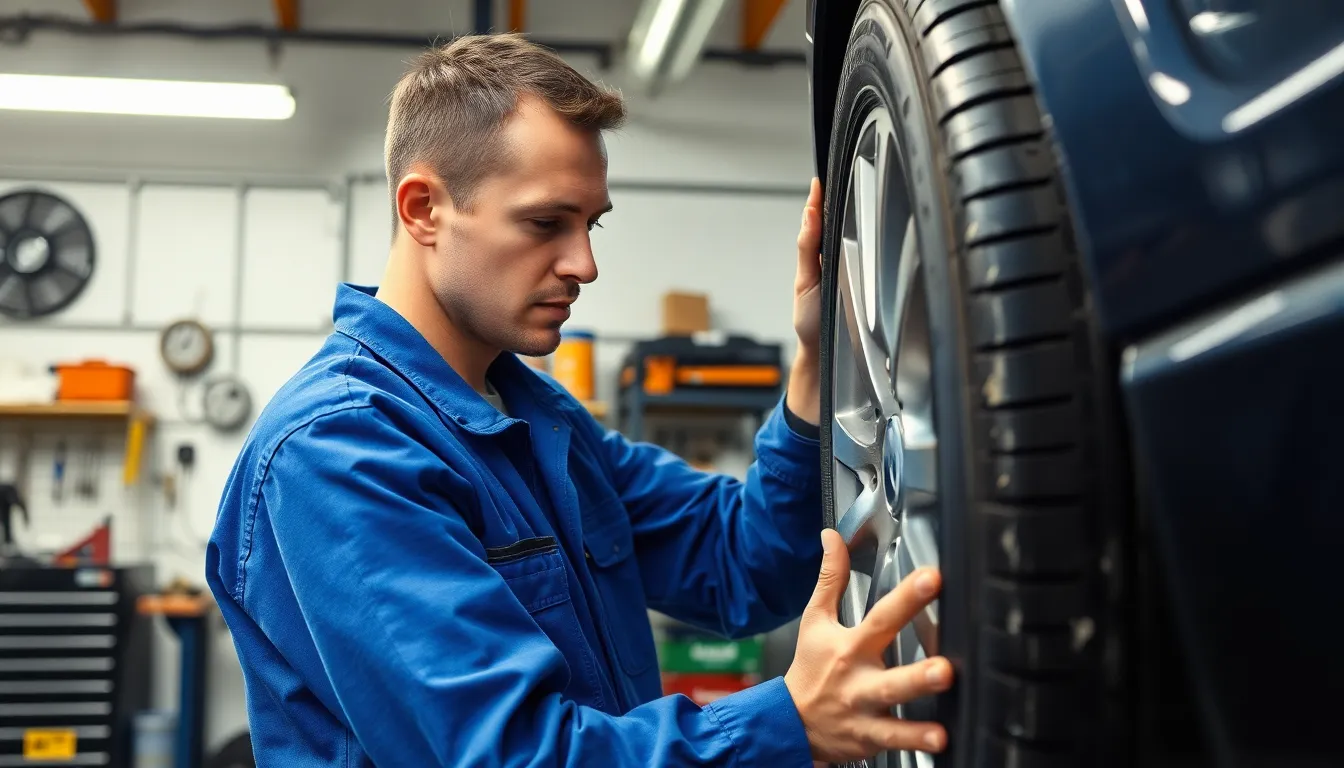
We can resolve tire squeaking issues through targeted maintenance approaches and professional interventions. Addressing these problems promptly prevents further damage to our vehicle’s components and ensures safer driving conditions.
DIY Maintenance Steps
Check and adjust tire pressure forms the foundation of effective tire maintenance. We measure pressure using a reliable gauge and inflate tires to manufacturer specifications found in our owner’s manual or door jamb sticker. Underinflated tires cause excessive flexing and reduced traction during turns.
Rotate tires regularly promotes even tread wear across all four wheels. We follow the recommended rotation pattern every 5,000 to 7,500 miles to prevent uneven contact patterns that create squeaking noises. Cross-rotation patterns work best for most vehicles with non-directional tires.
Inspect tread depth using the penny test or specialized measurement tools. We replace tires when tread depth reaches 2/32 of an inch or shows uneven wear patterns. Insufficient tread depth reduces grip and increases noise during cornering maneuvers.
Clean wheel wells and tire surfaces removes debris that can interfere with proper tire function. We examine brake components visible through wheel spokes for signs of excessive wear or damage that might contribute to squeaking sounds.
Professional Repair Options
Tire replacement becomes necessary when tires show important wear or damage beyond DIY repair capabilities. Professional technicians assess tire condition using specialized equipment and recommend replacements based on tread wear indicators and sidewall integrity.
Wheel alignment correction addresses misalignment issues that cause tires to scrub against road surfaces. Computerized alignment equipment measures camber, caster, and toe angles with precision that exceeds DIY capabilities. Proper alignment reduces tire wear by up to 30% and eliminates squeaking caused by incorrect wheel positioning.
Suspension system repairs target worn components that allow excessive wheel movement during turns. Professional diagnosis identifies failing shock absorbers, struts, or bushings that contribute to tire noise and handling problems.
TPMS calibration ensures tire pressure monitoring systems provide accurate readings after tire service or pressure adjustments. Technicians reset sensor thresholds and verify system functionality to maintain optimal tire performance monitoring.
Prevention Tips to Avoid Future Tire Squeaking
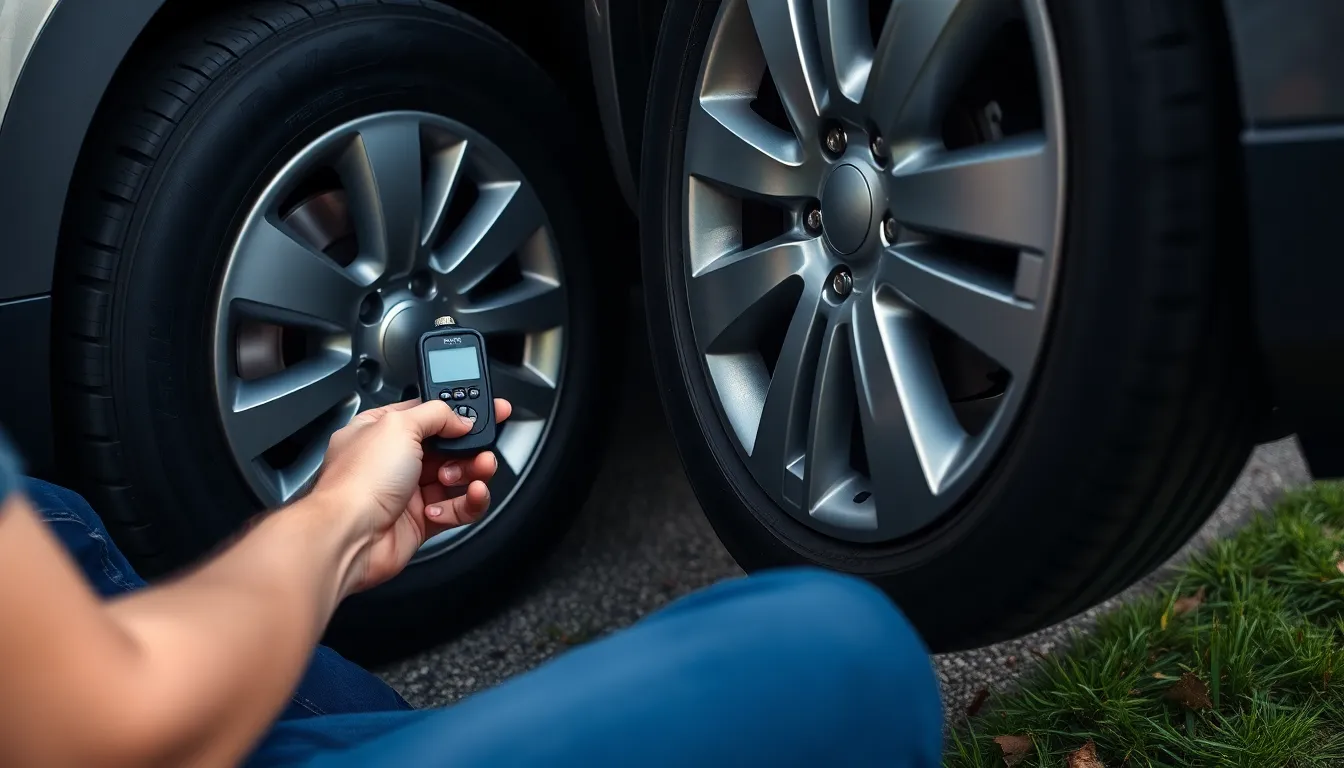
Maintaining proper tire pressure prevents the excessive flexing that causes squeaking during turns. We recommend checking tire pressure monthly using a digital gauge and inflating tires to the manufacturer’s recommended PSI specifications found on the driver’s side door jamb.
Regular tire rotation every 5,000 to 7,500 miles ensures even tread wear across all four tires. This practice maintains consistent traction levels and eliminates the uneven wear patterns that contribute to squealing sounds when cornering.
Inspecting tires for tread depth using the penny test or a tread depth gauge helps identify worn tires before they start squeaking. Replace tires when tread depth reaches 2/32 of an inch or when uneven wear patterns become visible across the tire surface.
Professional wheel alignment services correct misaligned wheels that cause tires to scrub against the road surface. Schedule alignment checks annually or whenever you notice uneven tire wear patterns to prevent future squeaking issues.
Driving techniques significantly impact tire longevity and noise production. Avoid sudden acceleration during turns as this causes tires to slip and squeal against the road surface.
Cleaning wheel wells and tire surfaces removes debris that can interfere with proper tire contact. Use a stiff brush and mild detergent to remove accumulated dirt and stones that may contribute to squeaking noises.
Monitoring suspension components during regular maintenance prevents worn parts from affecting tire contact with the road. Replace worn shock absorbers and struts to maintain consistent tire pressure against the road surface during turns.
| Prevention Method | Frequency | Expected Benefit |
|---|---|---|
| Tire pressure checks | Monthly | Prevents excessive flexing |
| Tire rotation | Every 5,000-7,500 miles | Even tread wear |
| Alignment inspection | Annually | Proper wheel contact |
| Suspension maintenance | Per manufacturer schedule | Consistent tire pressure |
Conclusion
We’ve covered the essential aspects of tire squeaking when turning and the steps needed to address this common automotive concern. By staying proactive with regular tire maintenance and understanding the warning signs we’ve discussed you’ll protect both your safety and your wallet.
Remember that tire squeaks aren’t just annoying sounds – they’re your vehicle’s way of communicating potential problems. Whether it’s checking tire pressure monthly rotating tires regularly or scheduling professional alignments these preventive measures will keep your tires performing optimally.
Don’t ignore persistent squeaking noises during turns. Taking action early prevents minor issues from becoming major repairs and ensures you maintain proper traction and control while driving.
Frequently Asked Questions
Why do my tires squeak when I turn?
Tire squeaking during turns typically occurs due to several mechanical issues affecting tire grip. Common causes include worn tires with insufficient tread depth, improper tire pressure (under or overinflated), misaligned wheels, and worn suspension components. These conditions reduce tire contact with the road surface, creating friction and noise during turning maneuvers.
When should I be concerned about tire squeaking?
You should seek immediate professional inspection if the squeaking persists regardless of road conditions, intensifies with turning speed, or is accompanied by steering wheel vibrations. These warning signs often indicate serious mechanical failures that compromise vehicle safety and can lead to accidents, especially during sharp turns or on wet surfaces.
Can I fix tire squeaking myself?
Yes, some basic maintenance can help resolve tire squeaking. You can check and adjust tire pressure, rotate tires regularly, inspect tread depth, and clean wheel wells. However, issues like wheel misalignment, suspension problems, or severely worn tires require professional repair services to ensure proper diagnosis and safe resolution.
How often should I check my tire pressure to prevent squeaking?
Check your tire pressure monthly using a reliable gauge. Proper tire pressure maintenance is crucial for preventing squeaking, as both underinflated and overinflated tires can create friction and reduce road contact. Many vehicles also have Tire Pressure Monitoring Systems (TPMS) that provide real-time pressure alerts for convenience.
What damage can squeaking tires cause to my vehicle?
Squeaking tires can cause premature tire wear, leading to potential tire failure if left unaddressed. The underlying issues causing squeaks, like misalignment, can also damage suspension and steering systems over time. This stress can result in expensive repairs beyond tire replacement, affecting brake components and accelerating steering mechanism wear.
How can I prevent tire squeaking in the future?
Prevent tire squeaking by maintaining proper tire pressure monthly, rotating tires every 5,000-7,500 miles, and regularly inspecting tread depth. Schedule professional wheel alignment annually, avoid sudden acceleration during turns, clean wheel wells regularly, and monitor suspension components. The penny test or tread depth gauge can help assess tire condition effectively.

